April 16, 2025 | 17:17 GMT +7
April 16, 2025 | 17:17 GMT +7
Hotline: 0913.378.918
April 16, 2025 | 17:17 GMT +7
Hotline: 0913.378.918
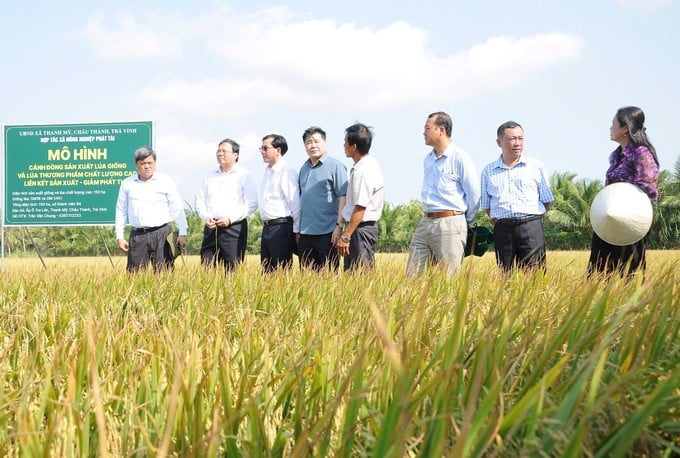
Deputy Minister of Agriculture and Rural Development Tran Thanh Nam (far left) surveyed at Phat Tai Agricultural Cooperative (Chau Thanh district, Tra Vinh province). Photo: Kim Anh.
As one of the five localities piloting the 1 million ha of high-quality rice project, Tra Vinh province implemented two models at Phat Tai and Phuoc Hao Agricultural Cooperatives in Chau Thanh district, with a total area of 98.4 ha.
The two pilot models have completed the harvest and measurement of greenhouse gas emissions in two consecutive crops: summer-autumn 2024 and autumn-winter 2024. The results showed that the effectiveness of reducing greenhouse gas emissions in Tra Vinh surpassed that of other provinces and cities participating in the project.
According to Dr. Mai Van Trinh, Director of the Institute for Agricultural Environment, based on the baseline (the foundation data to compare the effectiveness of reducing emissions when applying improved farming methods), the two pilot models in Tra Vinh all achieved very high results in reducing emissions.
Specifically, in the 2024 summer-autumn crop, the two pilot models decreased by an average of 8.18 tons of CO2e/ha compared to traditional farming outside the model. In the 2024 autumn-winter crop, the two models decreased by an average of 5.75 tons of CO2e/ha compared to farming outside the model.
Meanwhile, the baseline of the two models in Tra Vinh is up to 10.88-16.65 tons of CO2e/ha. This success is thanks to farmers' thorough straw collection in the field.
The pilot model in Can Tho City has been implemented in two crops, but the first crop has not been installed with the MRV system, so currently it has only assessed the reduction of emissions in the model, lacking a baseline assessment.
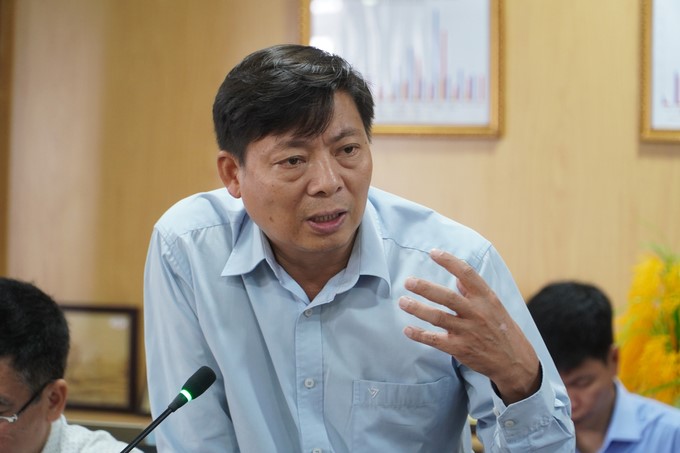
At the conference on expanding the pilot model of high-quality, low-emission rice cultivation in 12 Mekong Delta provinces taking place on January 3 in Can Tho City, Dr. Mai Van Trinh, Director of the Institute for Agricultural Environment, highly appreciated the ability to reduce emissions in two pilot models of Tra Vinh. Photo: Kim Anh.
The remaining localities only complete the harvest of one crop. Specifically, the pilot model in Soc Trang province decreased about 7.04 CO2e/ha in the 2024 summer-autumn crop.
Kien Giang province completed the 2024 autumn-winter crop harvest, with an emission reduction of about 7.8 tons of CO2e/ha.
In Dong Thap, the pilot model reduced 4.81 tons of CO2e/ha in the 2024 autumn-winter crop.
Besides, the productivity and profit of the two pilot models in Tra Vinh also increased significantly. In the summer-autumn crop of 2024, the average productivity reached 6.45 tons/ha, 0.3 tons/ha higher than outside the model; the total cost decreased by 14%, and the profit increased by 20%.
In the autumn-winter crop of 2024, the yield reached 7.05 tons/ha; the cost decreased by 10.6-15.8%, and the profit increased by 13.6-14.8%. The two models have currently completed sowing for the winter-spring crop of 2024-2025.
Mr. Le Van Dong, Deputy Director of the Tra Vinh Department of Agriculture and Rural Development, said that with a relatively large herd of cows (nearly 220,000 heads), the province has conditions to collect straw effectively. In addition to bringing remarkable economic efficiency, the models also decreased greenhouse gas emissions by 20-30% compared to outside the model. Since then, in the winter-spring crop of 2024-2025, Tra Vinh is expected to expand 14 more models with a scale of 728 ha.
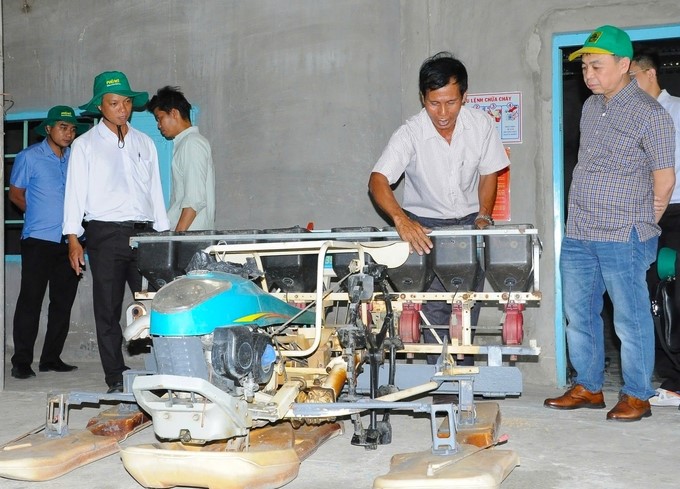
The National Agricultural Extension Center transfers machinery to serve Tra Vinh farmers with high-quality, low-emission rice cultivation. Photo: Kim Anh.
Additionally, Tra Vinh province has reviewed, evaluated, and registered 1,550 ha of the area of sufficient criteria for the implementation of the 1 million ha of high-quality rice project, preparing for the signing of an agreement to pay off the emission reduction from the Transformative Carbon Asset Facility (TCAF).
With the spirit of "guaranteed, not in a hurry, not greedy," Mr. Dong emphasized that Tra Vinh has proactively strengthened the community agricultural extension team in 42 communes participating in the project. This will be an "effective arm" to support cooperatives to implement the project in 2025 and the following years.
In particular, in 2025, Tra Vinh aims to have 10,550 ha specializing in high-quality rice cultivation in the 1 million ha project. The localities are proactively implementing the mass cultivation process, not just the model. Therefore, Mr. Dong proposed that the Institute for Agricultural Environment closely support the locality on how to measure and calculate the reduction of greenhouse gas emissions specifically.
Tra Vinh province has an area of rice farming in 2024 estimated at nearly 203,000 ha; the yield is estimated at 5.695 tons/ha, up 4.3% over the same period last year. The estimated rice output is over 1.1 million tons, up nearly 4% over the same period.
The Tra Vinh Department of Agriculture and Rural Development assessed that the productivity and output of rice increased due to the high stable rice price; farmers earned good profit, so they focused on investing in caring and fertilizing at the right time, helping rice plants grow well.
Translated by Thu Huyen
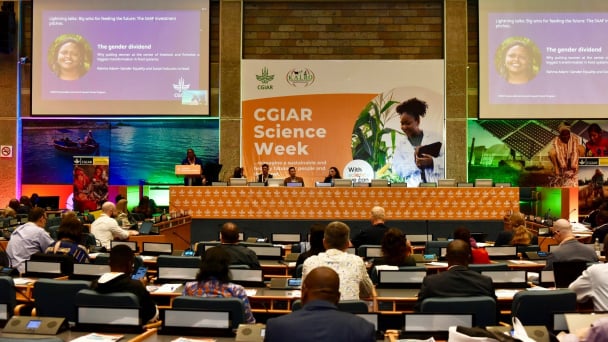
(VAN) The CGIAR’s Sustainable Animal and Aquatic Foods (SAAF) program represents a new approach that emphasizes the transformation of food systems toward sustainability.
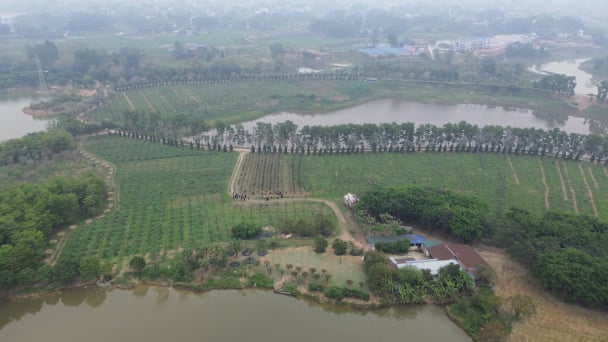
(VAN) Scientists assume that industrial agriculture has been 'outdated.' As a result, a comprehensive overhaul or a revolution in the direction of embracing ecological agriculture is needed.
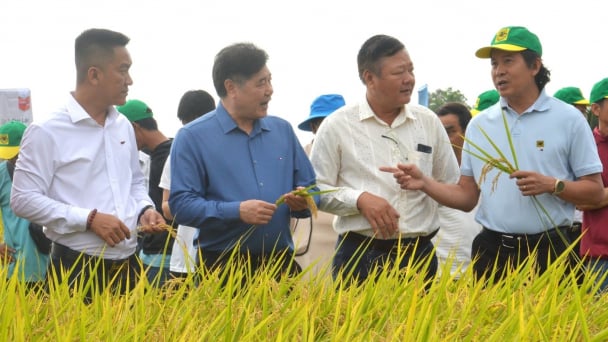
(VAN) The results from pilot fields are catalyzing the expansion of the One million hectares of high-quality, low-emission rice project in Kien Giang.
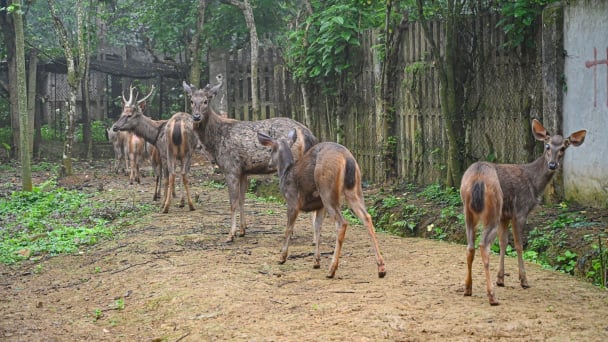
(VAN) On the morning of April 11, Cuc Phuong National Park received 18 individuals of endangered and rare wild animals from Da Nang city.
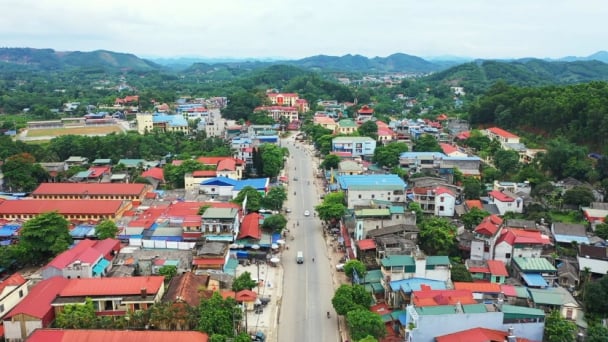
(VAN) FAO supports Vietnam in enhancing survey sampling techniques for the 2025 nationwide agricultural and rural census.

(VAN) By participating in the green transition, manufacturers become an indispensable part of the circular economy, contributing to resource optimization and environmental protection.
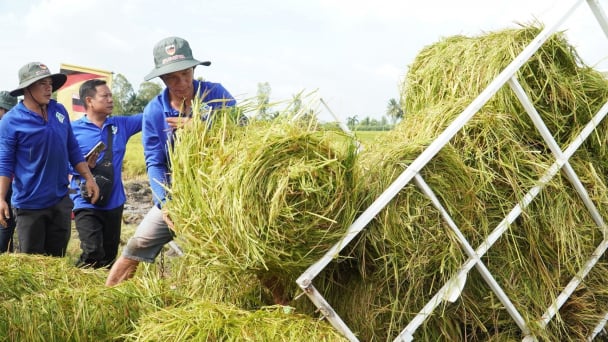
(VAN) The One Million Hectares of High-Quality and Low-Emission Rice Program can generate nearly 14 million tons of straw annually, posing an urgent requirement to diversify straw-based products.